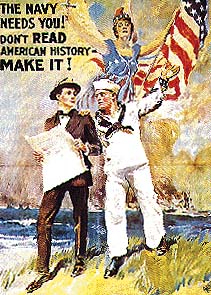U.S. History Outlines & Charts

World War I recruiting poster by James Montgomery Flagg
U.S. History Outlines & Charts

World War I recruiting poster by James Montgomery Flagg
Colonial Beginnings--The establishment of English colonies in America.
Slavery in the American Colonies--The first African-Americans arrived in Jamestown in 1619. Slavery greatly affected American attitudes towards race, work, and justice, particularly in the South.
18th Century American Colonies--A look at the ways America changed and grew in the 1700s, with attention to mercantilism, slavery, urban and rural life, and the three regions that defined the 13 colonies.
The Great Awakening--The religious revival that arose in the 1730s produced some of America's greatest preachers and greatest colleges.
Chart: French & Indian War--A quick look at the important events and battles of the French & Indian War.Prologue to Revolution--The French & Indian set in motion a series of actions and reactions that led to the outbreak of war in 1775.
Colonial Restraints--British laws enacted from 1759-1773 placed burdens on Americans and highlighted the growing differences between the colonists and the mother countryThe American Revolutionary War--Political and economic in origin, the colonial fight for freedom resulted in a new nation.
The Federalist Era--From 1789-1801, the Federalist Party dominated America's political and economic life.
Jeffersonian Era--Jefferson and Marshall, two very different Virginians, had tremendous impact on American life
Legacy of the Marshall Court--The decisions of Federalist Supreme Court JusticeJohn Marshall have shaped American judicial life in profound ways.
War of 1812--Frustration with British policies and War Hawks pushed America into an ill-advised conflict that left Washington in ruins.
Jackson Era--Andrew Jackson expanded the concept of American democracy while making the presidency a more powerful position.
19th Century ReformThe reformers of the 1830s and later sought to improve American life through a variety of causes.
Expansionism--Texas, Oregon & the Mexican Cession were the main scenes of America's westward expansion in the 1830s and 1840s.
1850s: Decade of Controversy--The decade 1850 to 1860 witnessed the unravelling of the nation over sectional issues.
Civil War The conflict that devastated the South, caused over 600,000 deaths, and helped define the United States as a true nation.
The Frontier West--Indians, miners, cowboys, and farmers and how their interactions opened up the western half of the continent
American Industrialization--The owners, workers, machines, and ideas that helped form the American industrial empire
Rise of the American City--Urban problems such as corruption and congestion were battled by reformers and the rise of a new form of Christianity called the Social Gospel which applied religious principles to social problems.
Gilded Age Politics--In a dreary time of party politics and economic disaster, the Populists energized America and helped promote William Jennings Bryan, an orator of prodigious power
Spanish-American War--A summary of the important background, major events, and results of the Spanish-American War (1898)
The Progressive Era--Seeking to create a just society through governmental action, direct democracy, and volunteerism, Progressives challenge traditional American ways of thinking and governing
U.S. Involvement in World War I--Events that helped move the U.S. from a neutral to a belligerent stand in a horrible and costly war
World War I's Aftermath: Attack on Civil Liberties and Betrayal at Versailles 1918-1920--Wilson's idealistic quest for a "war to end all wars" ends disastrously in France while civil liberties are squelched in America
Simulation: Civil Liberties in World War I--a fact-based simulation concerning four instances of First Amendment cases that demonstrate the tensions that come about for the Bill of Rights in time of war.
The
Roaring Twenties--The decade of the 1920s was marked with
disillusionment,
conservative Republican presidents, and major social and technological
changes
The Great Depression--America's most serious economic downturn had many causes and brought a decade of personal and national hardships
The Home Front During World War II--The industrial might of the U.S. was a major factor in turning the tide for the Allies. In addition, the U.S. faced issues of propaganda, racism, and women's roles.Origins of the Cold War--The early years of the competition between the U.S. and the Soviet Union and the fears it raised at homeWorld War II Conferences & Treaties--From the Nazi-Soviet Non-Aggression Pact which sacrificed Poland to the Potsdam Conference which brought the nuclear age to reality, World War II witnessed several significant conferences and treaties.
Key Events in the Korean War--The "temporary" division of Korea between Americans and Soviets becomes permanent as a result of Cold War tensions that result in war.
Key Events in the American Civil Rights Movement A brief overview of some major events in the civil rights struggle in the United States
1960s: The Tumultuous Decade--From Camelot to cynicism, the 1960s witnessed American society pull apart due to a number of forces, including racial tension, the Vietnam War, and student protest
The Vietnam War--Traces America's involvement from World War II to defeat in 1975
A
Chronology of Watergate--A chart detailing the major events of the
Watergate crisis.
Please cite this source when appropriate:
Feldmeth, Greg D. "U.S. History Resources"
USHistory.html (31 March 1998).
![]() Back
to U.S. History Resources main
page.
Back
to U.S. History Resources main
page.
